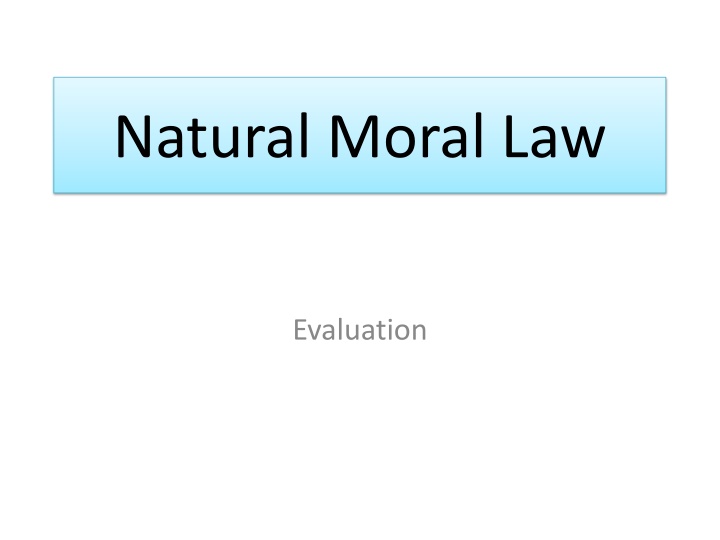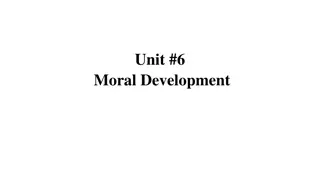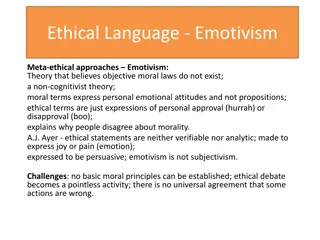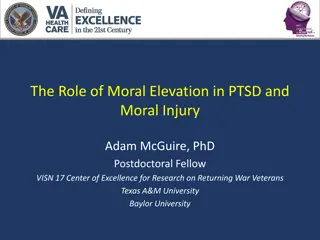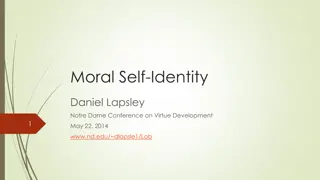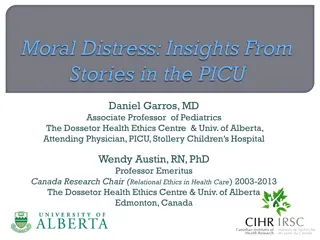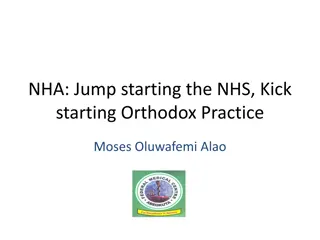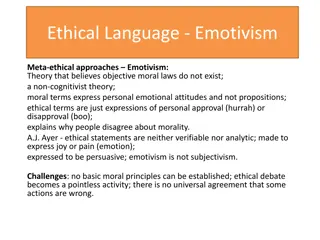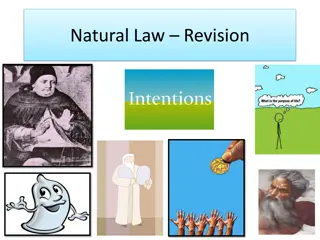Evaluation of Natural Moral Law: Absolutism, Relativism, and Ethical Considerations
The evaluation of Natural Moral Law explores the contrast between relativism and absolutism, highlighting the advantages and disadvantages of a deontological approach. It discusses how NML provides universal moral truths, clear answers in times of uncertainty, and sets boundaries for ethical behavior. However, criticisms point out potential injustices and conflicts with non-believers' perspectives on following an ethic rooted in divine will.
Download Presentation

Please find below an Image/Link to download the presentation.
The content on the website is provided AS IS for your information and personal use only. It may not be sold, licensed, or shared on other websites without obtaining consent from the author.If you encounter any issues during the download, it is possible that the publisher has removed the file from their server.
You are allowed to download the files provided on this website for personal or commercial use, subject to the condition that they are used lawfully. All files are the property of their respective owners.
The content on the website is provided AS IS for your information and personal use only. It may not be sold, licensed, or shared on other websites without obtaining consent from the author.
E N D
Presentation Transcript
Natural Moral Law Evaluation
Evaluative issues Examiners are looking for quality and not quantity in AO2. They want to see you evaluate and analyse the fors and againsts rather than simply list a few of them. Common mistakes need to be avoided: Don t just answer AO2 as strengths and weaknesses Don t list evaluate Add a conclusion
Evaluation of Natural Law 1. Relativism argues that everything depends on circumstances and that there are no universal moral rules. NML provides an opposing, absolutist and deontological view. R Bowie It enables people to establish common rules in order to structure communities . Absolutist R Bowie again It gives clear unambiguous answers to moral questions in times of moral uncertainty By insisting that there are universal moral truths it does give social advantages such as: Conditions to govern and protect citizens. It provides boundaries on behaviour and creates an environment of order. Eg:
Evaluation of Natural Law 2. The theory is not based on the outcome of the action which is a distinct benefit over Utilitarianism. Judging an action by it s outcomes is unknown / uncertain. Whereas, focusing on the motive; emphasis on the act as the moral imperative is a ethical factor we have direct control over. We are the creators and governors of morally. It emanates from our thoughts and initial actions. Mel Thompson if everything is created for a purpose, human reason, in examining that purpose is able to judge how to in order to conform to that purpose
Evaluation of Natural Law 3. A non believer would have no desire to follow a system of ethics based upon the belief in a creator God and fulfilling God s will. P Clarke If mankind has no religious destiny, it could be argued that the idea of following a natural law ethic ultimately makes no sense .
Evaluation of Natural Law 4. If promotes injustice as it fails to recognise that some acts, e.g. sex, can have more than one purpose and as a result discriminates against those who perform an act without fulfilling its purpose, e.g. a married couple having sex for pleasure (refer to G.E. Moore and the naturalistic fallacy). Jack Dominion, a Catholic scholar wrote in Passionate and Compassionate Love, that sex is a personal expression. It communicates recognition and appreciation between the partners . . . It brings couples reconciliation and healing after dispute and hurt, it celebrates life and provides meaning, it is a profound way to thanking each other for the loving partnership that they have. He separates children from this personal expression of love.
Evaluation of Natural Law 5. It is not dependant on cultural relativism.
Evaluation of Natural Law The theory eliminates emotions from the morally of the actions as it is based on reason. This prevents relativism, decisions being made in relation to emotion. Furthermore, emotions change from time to time which is not a good basis to form moral decisions on. The impact of emotions is one of the flaws of situation ethics which NML avoids. Thompson Feelings can change, but the issue of right and wrong remains fixed.
Evaluation of Natural Law The Natural Law approach to ethics creates a link between the creator, our creation and our purpose Bowie Natural Law directs people to their final destiny. It is the divine law, God s Law as opposed to human law.
Evaluation of Natural Law D Hume - Aquinas had placed too much emphasis on that which was natural and good and that which is not natural; such as homosexuality was considered by Aquinas as unnatural and therefore not good. Hume believed this position about what was natural was not particularly clear. what we find in nature without human intervention D Hume. This is a good attack. For example: things such as tooth decay are natural, but surely tooth decay is also bad. Does this mean that brushing my teeth is immoral because it prevents the natural order? No one thinks that brushing his or her teeth is immoral J Driver
Evaluation of Natural Law G E Moore wrote Principia Ethica 1903 in which he accused Aquinas of committing the naturalistic fallacy by deriving an ought from an is . Simply, he took a fact, such as sex is a function of reproduction and claimed that people ought only use it with knowing intention of creating new life. Lytton Strachey followed this criticism with that indiscriminate heap of shattered rubbish among which one spies the mangled remains of Aristotle, Jesus, Kant, Aquinas and Spencer. Plato seems to have come out tolerably well . That is how the accusation of natural fallacy has left these theories.
Evaluation of Natural Law Natural Law fails to consider the situation people find themselves in or the consequences of the action. For example, it does not allow abortion even in the case of rape (challenge from Situation Ethics). The theory states that divorce is wrong because it goes against one the precepts, to live in an ordered society . But, this limited vision of morality does not consider the harm or wellbeing of others in the relationship and the consequences of an action. (SE & UT, relativism)
Evaluation of Natural Law However, many people would contest the above point that there is such a thing as a universal human nature. R Bowie the idea of there being a fixed human nature is simplistic and seems to fly in the face of increasing diversity and the changeable nature of personal identity (human)
Evaluation of Natural Law It is simple and easy to follow as it assumes there is an ideal and universal human nature all humans need to do is strive towards this state. Peter Cole and Richard Gray Being human means acting in line with our true natures when we follow our natural inclinations . It provides clear cut laws e.g. stealing is wrong as it goes against the precept to live in an ordered society. Absolutist R Bowie again It gives clear unambiguous answers to moral questions in times of moral uncertainty
Evaluation of Natural Law Atheists would challenge the idea that God- given reason and nature provide us with the source of law. Thompson stated that if one comes to the conclusion based on observation such as innocent suffering that the world is unlikely to be the product of an omnipotent or loving creator then the natural law argument loses foundation.
Evaluation of Natural Law In the New Testament, Jesus appears to oppose legalistic (law-based) morality. He appears to have adopted a form of personalism (Situation Ethics). He says people are more important than rules e.g. the healing on the Sabbath (Matthew 12v9-13).
Evaluation of Natural Law Many argue that Natural Law promotes both justice and moral behaviour by advocating through the primary precepts basic human rights such as the right to life, the right to education and the right to live in an ordered society. Vardy and Grosch At the end of the second world war, Nazi war criminals were tried at Nuremburg according to what were claimed to be universal moral laws which were closely modelled on natural law thinking
Evaluation of Natural Law The Natural Law theory is outdated. James Rachels in his book The Elements of Moral Philosophy stated the theory of Natural Law has gone out of fashion . The world as described by Galileo, Newton and Darwin has not place for facts about right or wrong. There explanation of natural phenomena make no reference to values or purposes.
Evaluation of Natural Law The Natural Law approach seems to be supported by religious texts. St Paul . . .Law in the hearts of all men Genesis . . . Chapter 1 where it states that all humans should reproduce Exodus 20 do not murder upholds the primary precept to live in an ordered society . Clarke An extra dimension to Aquinas theory is his identification of natural law with divine law. What was right or wrong in regard to nature and its laws was also right or wrong in the eyes of God.
Evaluation of Natural Law The Roman Catholic Church would argue that Natural Law has provided an adequate basis for making moral decisions for over seven hundred years. It forms the basis of moral teaching. 2011 Pope Benedict said Christianity has pointed nature and reason as the true sources of law and to harmony of objective and subjective reason, which naturally presupposes that both spheres are rooted in the creative reason of God.
Jesus teachings appear to contradict some of the Natural Law s primary precepts, e.g. you have the right to protect yourself from the primary precept to defend the innocent . Jesus stated (Matt 5v39), If someone strikes you on the right cheek, turn to him the other also . Jesus teachings are based on love and not reason. John 13v34 Love one another. As I have loved you . . . Quakers link the attitudes to same sex relationships.
Evaluation of Natural Law Natural Law seems to override free will. Some scholars believe that people should have the freedom to make their own moral choices e.g. Fletcher Situation Ethics
